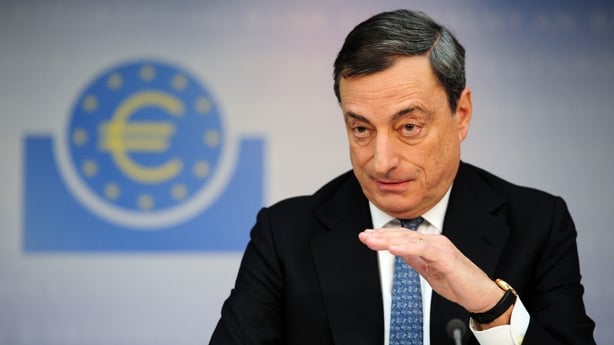The European Central Bank raised its emergency funding for Greek banks slightly today in a step to help banks partially reopen after euro zone governments agreed in principle to grant Athens a new three-year loan.
ECB President Mario Draghi said the bank's governing council had increased emergency liquidity assistance by €900m for one week at the request of the Bank of Greece.
Mr Draghi was speaking at a news conference in Frankfurt after the ECB left euro zone interest rates unchanged.
"Liquidity provision according to our rules was never meant to be unlimited and unconditional," he said, adding the Eurosystem of central banks's total exposure to Greece had risen to €130 billion.
The ECB chief said it was hard to predict when capital controls imposed on June 29 after the breakdown of bailout negotiations could be lifted, but it was important to avoid a run on the banks.
Rebutting criticism in Greece that the ECB had starved Greeks of cash, he noted that the biggest deposit flight had coincided with political events such as the January election and the collapse of bailout talks in June. stability were to materially change, the ECB would respond to such a situation by using all the instruments available within its mandate," he said.
The ECB rolled out quantitative easing earlier this year to get the currency block out of deflation and its last forecast in June indicated that inflation would rise to the target of just under 2% by 2017.
"So I find these observations that there wasn't enough liquidity assistance or that there was a bank run caused by the ECB quite unwarranted, certainly unfounded," he added.
Draghi said the ECB had always acted on the assumption that Greece would remain a member of the euro zone, but that depended entirely on the Greek authorities and other member states, and not on it.
Before agreeing to raise ELA, the ECB needed to ensure that Greece will have the temporary financing to repay a €3.5 billion plus interest payment due to the ECB on Monday.
Draghi said all evidence indicated that Greece would make that July 20 payment and clear its arrears to the International Monetary Fund.
A temporary €7 billion EU loan has been agreed in principle but technical details will take until tomorrow to iron out, euro zone officials said.
Draghi said the ELA increase granted was fully in line with the extra liquidity requested by the Greek central bank.
He also said the Greek crisis had shown up the fragility of the euro zone and the need for stronger integration within the bloc.
"This union is imperfect, and being imperfect is fragile, vulnerable and doesn't deliver all the benefits that it could if it were to be completed. The future now should see decisive steps on further integration," he said.
After the ELA increase, Greek banks are likely to open only with reduced operations and cash withdrawal limits at least until a bailout package is passed and banks receive at least some of the €25 billion earmarked for recapitalisation.
ELA has been held steady since late June, forcing banks to close and limiting cash withdrawals to €60 a day, disrupting an economy already in recession. The Greek economy has shrunk by a quarter since the start of the country's troubles.
Still, a limited bank opening would create the impression of normality and allow the Greek central bank to release cash that one official said was now held in its vaults for an emergency, via the banks into the economy.

Earlier, the European Central Bank left interest rates unchanged, holding them at record lows as it continues a money-printing scheme to lift the economy.
The decision to leave the cost of borrowing unchanged was widely expected after the ECB cut rates to rock-bottom levels last September and said they had hit "the lower bound".
At today's meeting, the ECB left its main refinancing rate, which determines the cost of credit in the economy, at 0.05%.
It also kept the rate on bank overnight deposits at -0.2%, which means banks pay to leave funds at the centralbank, and held its marginal lending facility - or emergency overnight borrowing rate for banks - at 0.3%.
Meanwhile, the ECB's €60 billion per month asset purchase programme will continue until September 2016 or until inflation rises to its target, Mario Draghi also said today.
"The asset purchase programmes continue to proceed smoothly," Draghi said.
"If any factors were to lead to an unwarranted tightening of monetary policy, or if the outlook for price stability were to materially change, the ECB would respond to such a situation by using all the instruments available within its mandate," he said.
The ECB rolled out quantitative easing earlier this year to get the currency block out of deflation and its last forecast in June indicated that inflation would rise to the target of just under 2% by 2017.

